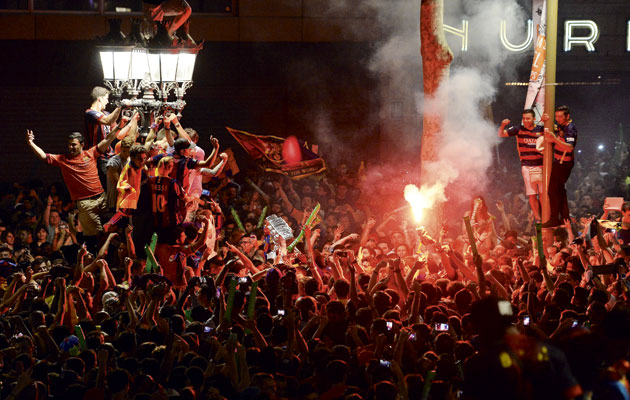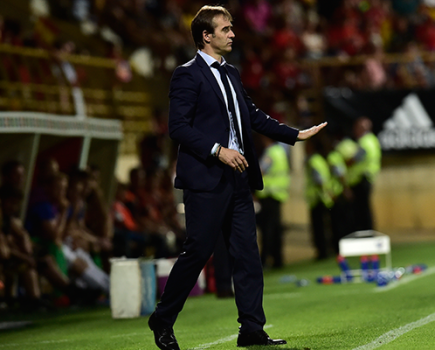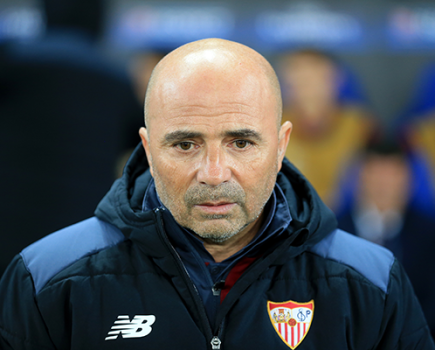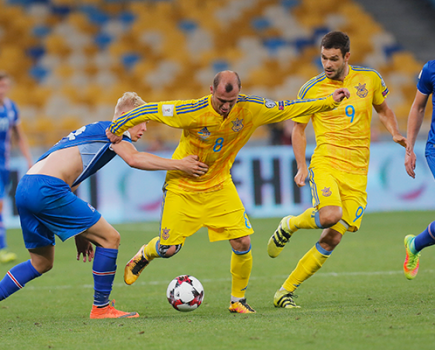There was no game at Camp Nou, but 47,270 people still turned up one Saturday in July anyway. It was election day in Catalonia, the chance to vote for FC Barcelona’s new president, and so they came – starting with coach Luis Enrique, who arrived six minutes after the polling booths opened. Asked a few days before if he planned to exercise his right to vote as a member and if he knew who he would be voting for, he responded succinctly: “Yes and yes.”
He was not alone. Xavi also came, as did Carles Puyol and Gerard Pique. Johan Cruyff voted, although the man he supported, former president Joan Laporta, did not emerge victorious. Instead, the winner was Josep Maria Bartomeu.
The outgoing president, under whom Barcelona won the league, Spanish Cup and Champions League treble, is back in power for the next six years.
Bartomeu had been Barcelona’s president for 18 months, having taken over from Sandro Rosell, who was forced to resign over the scandal surrounding the Neymar signing. That ended with Rosell and Bartomeu both charged with fraud, but while it cost the former his post it did not stop the latter from taking over without having to go to the polls – and nor, ultimately, winning the elections comfortably.
With the club seemingly in crisis at the turn of the year, elections were called in January, with Bartomeu insisting he had done so “to reduce the tension around the club”. By July, Barca had won everything and the panorama had changed entirely.
Bartomeu had looked to be in a weak position, his reign certain to end, but he managed the crisis well and used the interim period to strengthen his electoral position. Slowly, the team improved, ending with victory in Berlin. Now his mandate is an extremely strong one.
Of a total electorate of 109,637 only 47,270 members voted. At 43 per cent that may sound low, but the turnout was actually considered to be quite good, not least with elections happening in July, at a time when many Barca supporters are out of the city, and on a hot day in the school holidays when those who are in the city have better plans. There is no provision for proxy voting or postal votes.
Bartomeu polled 54.63 per cent of the vote, while Laporta, who was president between 2003 and 2010, polled 33.03 per cent. Agusti Benedito ended with 7.16 per cent and Toni Freixa 3.7 per cent. All four men had been part of the same team that swept to victory under Laporta in 2003, but divisions had opened up, paralleling the historic divide that has beset Barcelona for three decades.
Laporta and Rosell had been president and vice-president, but their relationship ended in bitterness and recrimination; in hatred, in fact. Rosell then won elections in 2010, the most voted-for president in the club’s history, with Bartomeu as his vice-president. When Bartomeu took over, the tone softened, and there was little doubt that he was more likeable than his predecessor, but the divide remained palpable. Played out through the press, it was often nasty too.
Benedito had been there in 2003 under Laporta, albeit not on the board, and had been the first to leave, although ideologically he is reasonably close to Laporta. Freixa had been there too, and was later the board’s spokesman under Rosell and Bartomeu, but he had complained the board had been bypassed, decisions taken unilaterally, and now he was going it alone. Laporta accused him of being Bartomeu’s “submarine” but Freixa called himself a “third way”. Benedito complained of a “civil war” that would not end if Laporta or Bartomeu won.
When Bartomeu won, he insisted that “together” Barcelona would be stronger. Whether that unity is lasting, or even sought, remains to be seen. With 75 per cent of the votes counted, Laporta left, not waiting for the final result. “Never surrender,” he insisted. In the end, the treble had, quite naturally, proved decisive.
“Fans are happy,” Bartomeu said, putting it in simple terms. An electorate by nature fairly conservative was still less likely to deliver a revolution after such success.
Bartomeu’s campaign had been a cautious, defensive one, in which he avoided direct confrontations, agreeing
to go to only one debate. “When he was president he acted like a candidate, now that he is a candidate he acts like he is the president,” Benedito had complained. Bartomeu’s campaign could be summed up in two words he used often: “trident” and “treble”. Neymar, Suarez and Messi; league, cup and European Cup; both are strong hands to play – even if the opposition sought to present the success as coming in spite of Bartomeu rather than because of him, while Laporta tried to claim “ownership” of Messi.
At an institutional level, there are key issues that still need to be handled, from the Neymar case to the FIFA transfer ban; from the UEFA investigation over the Catalan independence flags unfurled at the Champions League Final to the rocketing salaries, which account for almost 80 per cent of the budget; from redevelopment of the stadium to the shirt sponsorship with Qatar – an emotive issue during the campaign.
There was also much debate over Barcelona’s economic stagnation and their debt (estimated
at around €300million), as well as the apparently declining significance of La Masia, the youth academy.
As for the first team, there were still debates, but this was an atypical campaign: the candidates came with
their own sporting directors and there were some debates about signings, but the FIFA ban lessened the impact of those promises and rather than promising certain coaches, all four candidates said that they would continue with Luis Enrique. The coach’s contract had been renewed by Bartomeu just before he was forced to step down as the electoral period opened.
Continuity won out. The question now is: will Barcelona’s success continue? Two signings have already been made. Aleix Vidal arrived from Sevilla and can play at right-back or on the right side of midfield. Arda Turan came from Atletico Madrid in a deal set up by Bartomeu but finalised by the interim committee which oversaw the day-to-day running of club during elections. Xavi, meanwhile, has departed, of course.
Unlike at Real Madrid – who are under new management with Rafa Benitez, have lost Iker Casillas, are still trying to sign another striker, have to restructure the team and maybe move Gareth Bale in to middle, and who are still pursuing David De Gea – it appears unlikely that there will be any other major changes a Barcelona. Continuity is the ley but continuing their success will not be simple.
It is no secret they want Paul Pogba, but that is more likely to be a move for next year. Pedro has departed, with Chelsea paying his buyout clause When you have Messi, Neymar and Suarez ahead of you, you know that your opportunities will be few.
A couple of days after the elections, Barcelona headed off to the USA for pre-season training, minus the players who played at the Copa America: Bravo, Neymar, Alves, Mascherano and Messi. “Leo needs a rest,” Luis Enrique said.
The team will play just two friendlies before the league campaign gets going – and once it starts, it won’t let up. It may not be the ideal preparation for a long season that will end with the European Championship. The challenge is the six trophies won by Pep Guardiola’s side five years ago.
Turan and Vidal will not be available because the FIFA ban means they can’t play for Barcelona until the winter window opens in January. But fortunately for Barca, and for Bartomeu, it’s already an impressive team.
A treble-winning team and an election-winning team too.
10 Talking points
1) At the end of last season, Elche survived and Eibar were relegated.
Then the league sent Elche down and reinstated Eibar because of the former’s financial problems, with the high court upholding Elche’s sentence. Not for the first time, Spanish football is a bit messy.
2) Carlos Bacca has gone to Milan, but Sevilla’s sporting director Monchi has, as ever, been hugely active in the transfer market and has a habit of succeeding.
3) Fernando Torres, Jackson Martinez, Luciano Vietto, Antoine Griezmann and Yannick Ferreira-Carrasco might just represent the best attacking line Atletico Madrid have ever had.
4) Under Peter Lim, Valencia are back in the Champions League and flexing their financial muscle. Last year they benefited from having no European competition; how will they do this season with games every four days?
5) Phil Neville has thrown himself into his role as assistant coach at Valencia and is working hard at learning Spanish. Will other Englishmen follow his example?
6) Villarreal may have lost Denis Cheryshev, who returned to Real Madrid after last season’s loan, but they retain a stability of which most clubs can only dream.
7) Javi Gracia worked wonders at reviving Malaga while bringing through youth. But as the exodus of talent continues, how long can he keep producing?
9) Last season Fran Escriba led Elche to a survival that was eventually taken away from them. Now back at Getafe, where he was assistant coach to Quique Sanchez Flores, things won’t be much easier.
10) One of Real Sociedad’s problems last season was they were simply not fit. With
a pre-season under his belt, coach David Moyes should now have got what he wants.








